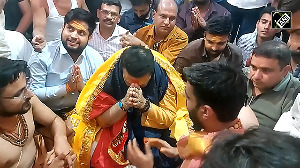For many months now the airport-bound public, supported by graphic media accounts, have been shouting from the rooftops about the outrageous conditions prevailing at the country's main airports but the mountain of evidence seems to have been water off a duck's back.
The other day the deputy chairman of the Planning Commission, Montek Singh Ahluwalia, instead of merely flying off from Delhi's IGI Airport, flew off the handle and summoned the airport developers to deliver a sharp public rap on their knuckles.
What has since transpired, equally publicly, is one of those familiar, tragicomic spats of Indian officialdom that leaves the poor passenger either hanging in the air or perpetually grounded.
The way Ahluwalia and Aviation Minister Praful Patel are going for each other in a string of quarrelsome missives and statements - seething with sarcasm, vitriol just kept in check - is a shameful example of why India, the emerging economic powerhouse of the world, can't clean up the mess at airports, can't finish a highway, can't stop electricity theft and can't provide enough colleges.
Patel accuses the Planning Commission of delays and holding up big expansion plans at Kolkata and Chennai airports; Ahluwalia says it isn't the Planning Commission but the Public Investment Board and that size does matter.
In other words, how the scale, design and location of airports should be prioritised is the contentious issue between the two men who hold the public purse strings. It's not an edifying sight and it's no wonder that stranded passengers feel that the private players in the modernisation of Indian airports are getting away with murder.
The Big vs. Small Airport fight carries a dangerous echo of the interminable controversy over dams, the only difference being that here it is not hundreds of thousands of the poor who are endangered by displacement but millions of paying travellers and tonnes of cargo. Any delay or obstacle raised affect not just the aviation industry but seriously dent the economy.
Many of the country's main airports - Delhi and Mumbai in particular - have long been strained to the point of collapse. Now that they have finally fallen to bits, the blame game has begun, with the future of public-private partnerships in jeopardy.
Both sides are responsible but, in fact, it's the Ravana-headed monster of government that should take the rap.
Nearly a dozen disparate departments and authorities handle the running of Indian airports - from the Airports Authority in charge of ATCs, the Home Ministry in charge of immigration, the DGCA for operations, central and state police handling security, sarkari karamcharis as cleaners, not to speak of numerous others expected to provide and clear land use.
And like the two policy-makers at the top in the midst of a slanging match, each is a law unto itself. Private partners like GMR and GVR, humiliated from time to time, have good reason to shrug their shoulders and argue that matters are outside their control.
This is not to say that public-private partnerships don't or can't work - the Delhi Metro or suburban highways in Delhi and Mumbai are equally ambitious projects dealing with multiple agencies but there is a single authority, even a person, in charge, committed to deliver on time, within budget and with minimum hardship to the public during the course of construction. Kerala's airports, in particular the smoothly successful public-private partnership at Kochi, is a model of how the scheme can work.
Messers Patel and Ahluwalia, both widely-travelled men, cannot argue that they have not been airborne out of IGI airport in recent times. But like privileged high-fliers they possibly arrive with escorts and minions and are whisked into private lounges, leapfrogging the hideous hurdles of public entry, baggage checks, security and immigration.
Never mind the back-breaking queues, a brief encounter with a dirty, dishevelled ballpoint-waving immigration official or a visit to the squalid loo would silence them from creating such a public ruckus.
They would learn to keep their heads down and get on with the job rather than being manhandled by the barbarians at the airport gate.







 © 2025
© 2025